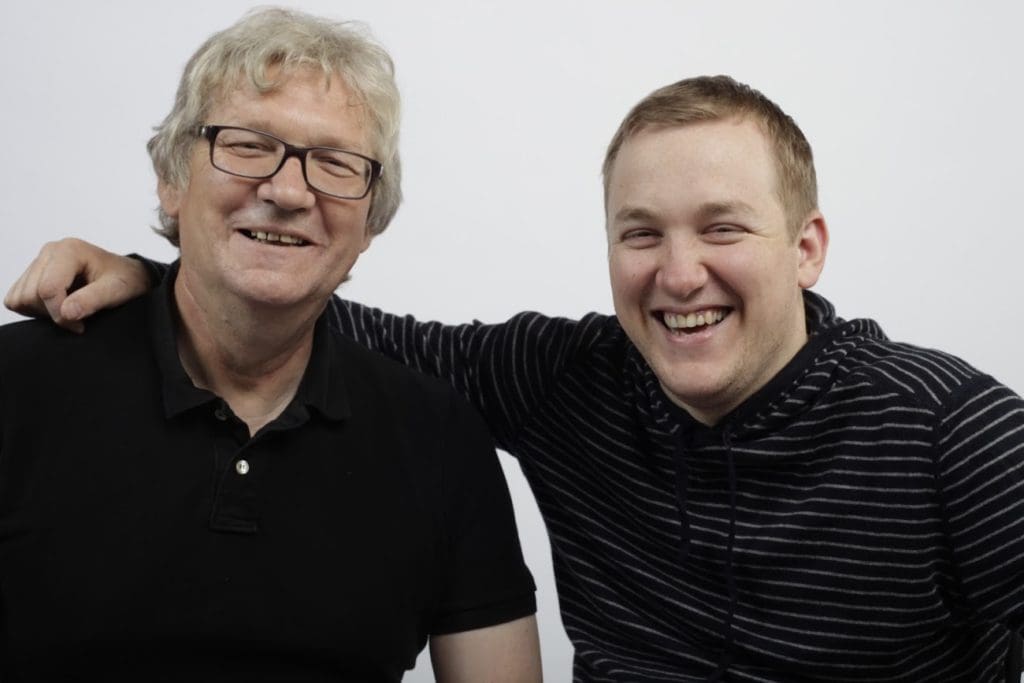Pete’s story: a family member’s mental health is important too
8 April 2020

Spinal cord injury affects the lives of everyone around the injured individual. Pete knows this very well – his life was changed forever after his son Luke sustained a high-level spinal cord injury while on holiday to France with family friends aged 15.
“Luke dived into the sea, and landed chin-first on a sand bank. The impact snapped his neck, and he was permanently paralysed instantly. He would have drowned if a family friend didn’t spot him.”
Pete’s life was transformed just as much as Luke’s. As he was widowed, Pete found himself looking after both Luke and his 13 year old sister. Peter says as a parent, the hardest thing about a loved one sustaining a spinal cord injury is fighting the urge to do everything for them.
“I remember Luke dropping a fork while in hospital. I went to pick it up, but he told me not to. He wanted to do it himself, so he could remain independent. It took him 20 minutes, but he eventually managed to pick it up himself.
“Here I learned that you need to wait for your loved one to ask you for help. That’s the hardest thing for a parent to do, it goes against all your parental instincts, but you have to let them be independent.”
Independence is of prime importance for someone with a spinal cord injury. Luke had always been a keen sportsman. He wasn’t going to let his injury stop him from taking part in our ski karting course, even if his dad was left nervous!
Pete realised early on that whilst he needed to care for his family, he had to find time to care for himself too.
“You should never feel guilty about doing things for yourself. If you aren’t mentally ok, what chance do your kids have? ”
With Luke off on our ski course, Pete took off that same week too. With this new mentality Pete also threw himself back into his own interests. Having worked in the music business his whole life he went to gigs and local jam sessions. He also made sure to have things that he could look forward to, such as going to the cinema with friends.
It can also be difficult for siblings, as attention is often paid more to the injured person. Pete made sure to also have alone time with his daughter and keep their routines in place.

Pete with his family
Our family mentoring programme wasn’t available to Pete at the time of Luke’s injury. If it was, Pete says he would have loved the opportunity to talk to someone in the same situation who would have understood his fears and challenges at the time. When we started running this service, Pete decided to train to become a family mentor himself.
Like us, Pete knows that mentoring is all about sharing experiences and reassuring people that they aren’t on their own and there is light at the end of the tunnel. But of course he understands this can be difficult to take on board initially.
“Mentoring is about helping people make the best of what they’ve got, and not dwell on what they haven’t. That’s easy to say, but hard to put into practice!”
Helping the family of the injured person come to terms with this new way of life can be challenging. Emotions run high and it’s important for them to recognise that it’s ok to feel frightened, resentful, angry or depressed. Pete compares the impact of spinal cord injury to a type of bereavement. As one of our first family mentors, Pete knows that talking openly can help both the family and the injured person move past these initial feelings and help everyone realise that spinal cord injury isn’t the end of the world, but the beginning of a new one. He stresses listening is an important part of mentoring.
Four years after Luke graduated with an English Literature degree from the University of Greenwich, Pete graduated himself from the same University at 60 years old, with a degree in Psychotherapy. He chose to study this partly because of what they have gone through as a family and partly because of counselling he had received himself. He describes the experience as like son like father, rather than like father like son.
On top of the mentoring he provides for us, Pete, a practicing psychotherapist also works with the Prince’s Trust and Mind. He continues supporting his own mental health by practicing mindfulness, but admits it can take a lot of self-discipline – he shares with us some of his top tips that you might find helpful if you want to take up the technique:
- Mindfulness can help reduce stress and calm the mind. This is especially useful at a time when we need to look after ourselves. What good are we if we’re not mentally and physically giving ourselves the needed support?
- Perseverance is key – be patient as it takes time to learn.
- Look to build up to at least 20 mins a day rather than one long session once a week. This will help lower your initial expectations and you won’t be disappointed in the long run as it will be more achievable.
- It helps to practice at the same time and in the same place so it becomes part of your normal daily routine – especially when you are starting to learn the technique.


